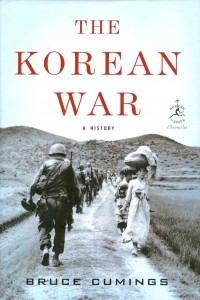 There are an awful lot of books on the history of the Korean War. So many, in fact, that it’s confusing determining which one to pick. The best we here at WoWasis have read, as well the shortest (at 243 pages of text), is Bruce Cumings’ The Korean War: a History (2010, ISBN 978-0-679-64357-9). The author’s perspective is defined early in the book, underscored by this excerpt from the introduction:
There are an awful lot of books on the history of the Korean War. So many, in fact, that it’s confusing determining which one to pick. The best we here at WoWasis have read, as well the shortest (at 243 pages of text), is Bruce Cumings’ The Korean War: a History (2010, ISBN 978-0-679-64357-9). The author’s perspective is defined early in the book, underscored by this excerpt from the introduction:
This is a book about the Korean War, written for Americans and by an American about a conflict that is fundamentally Korean, but one construed in the United States to have been a discrete, encapsulated story beginning in June 1950 and ending in July 1953, in which Americans are the major actors. They intervene on the side of the good, they appear to win quickly only to lose suddenly, finally they eke out a stalemated ending that was prelude to a forgetting. Forgotten, never known, abandoned: Americans sought to grab hold of this war and win it, only to see victory slip from their hands and the war sink into oblivion. A primary reason is that they never knew their enemy—and they still don’t. So this is also a book seeking to uncover truths that most Americans do not know and perhaps don’t want to know, truths sometimes as shocking as they are unpalatable to American self-esteem. But today they have become commonplace knowledge in a democratized and historically aware South Korea… Least known to Americans is how appallingly dirty this war was, with a sordid history of civilian slaughters amid which our ostensibly democratic ally was the worst offender, contrary to the American image of the North Koreans as fiendish terrorists. The British author Max Hastings wrote that Communist atrocities gave to the United Nations cause in Korea “a moral legitimacy that has survived to this day.'” What then of South Korean atrocities, which historians now know were far more common?
The book is far more than a hack job on early South Korean military figures and leaders, as it points out American atrocities (No Gun Ri, for example) and Northern ones as well. The Southern leadership, however, made it a point of assuming large elements of its population were Communists, forcing them to dig their grave trenches, then lining them up and shooting them. Many in the South Korean leadership cadre were trained in Japan, one reason Kim Il Sung in North Korea never trusted them. So the basis of the Korean War is an essential part of the Korean story that continues to unfold today. Among the most fascinating elements of the book are the passages involving the U.S. use of napalm, the origin of the word “gooks,” and the Northwest Youth Corps death squads that, as an unofficial arm of the U.S. Military, allowed teenaged thugs to massacre thousands of Korean, perhaps most notably on the island of Jeju (Cheju).
From the perspective of the U.S. reader, Cumings’ passages on Korea being the foundation for the U.S. military-industrial complex and the springboard into Vietnam are sobering. The book is highly recommended for a number of readers on various subjects, including those interested in modern Korean history, Kim Il Sung, Syngman Rhee, the Vietnam War, and the buildup of the U.S. into a military-industrial behemoth. Buy it now at the WoWasis eStore.
Leave a Reply